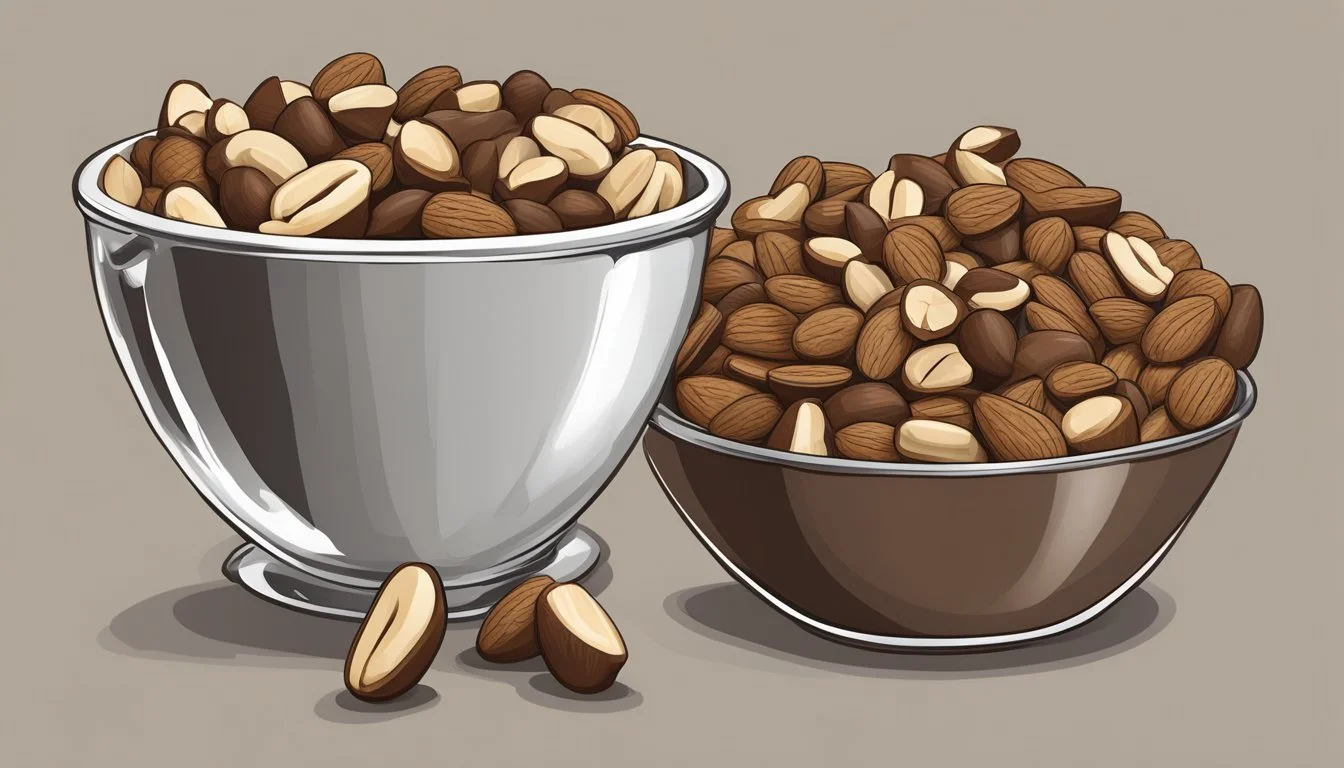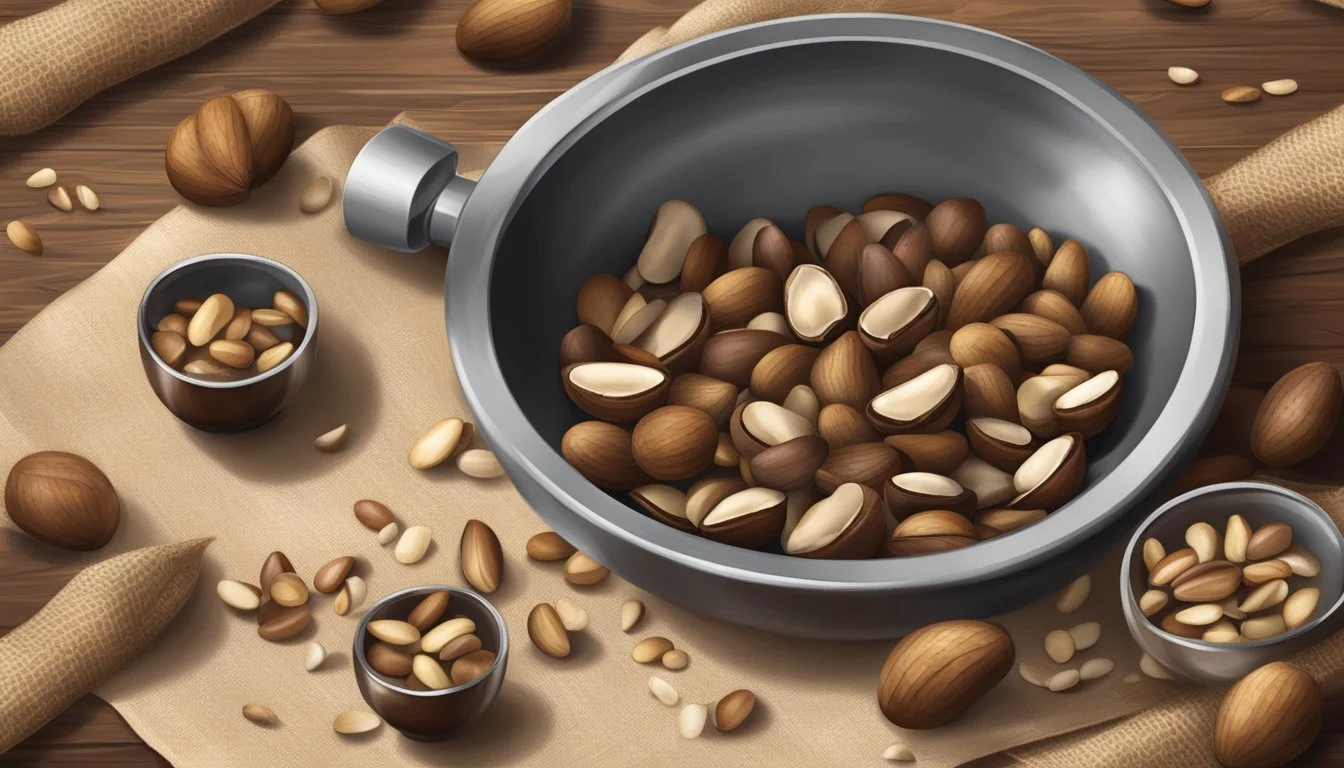How Many Cups in a Pound of Brazil Nuts
Quick Measurement Guide
When measuring Brazil nuts (What wine goes well with nuts?) for culinary purposes, it's common to encounter the question of how to convert weight to volume. For instance, a pound of Brazil nuts can be translated into cups, a unit more familiar to many home cooks when following recipes. This conversion is not only crucial for accuracy in cooking but also helpful for portion control and dietary planning.
One pound of Brazil nuts equates to approximately 3.49 cups, though the exact number can slightly vary due to the size of the nuts and how they settle in the measuring cup. Precision is key in cooking and baking, so knowing this conversion can ensure recipes turn out as intended. Brazil nuts are not only a flavorful addition to dishes but also come packed with nutrients, making proper measurement important for both taste and health.
Understanding the weight-to-volume conversion is also valuable for those incorporating Brazil nuts into a health-conscious diet. These nuts are known for their richness in selenium, a nutrient that supports various bodily functions, but which should be consumed in moderation. Properly measuring the amount of Brazil nuts consumed can help maintain a balanced intake of nutrients.
Measurement Conversions
When it comes to cooking and baking, precise measurement conversions are essential for successful outcomes. This section provides specific conversions for Brazil nuts from cups to pounds and from grams to ounces, ensuring accuracy for any culinary endeavor.
Cups to Pounds
One pound of Brazil nuts is equivalent to approximately 3.5 US cups. This conversion is particularly useful for recipes requiring a volume measurement rather than weight.
Cups Pounds 1 0.29 2 0.57 3 0.86 4 1.14
Grams to Ounces
Here, they'll find the conversion from grams to ounces, which is crucial for those following recipes using imperial measurements. There are 28.35 grams in an ounce.
Grams Ounces 10 0.35 20 0.71 50 1.76 100 3.53
Note: The conversions mentioned are based on the average density of Brazil nuts. Adjustments may be needed depending on the size and the actual density of the nuts used.
Nutritional Profile
Brazil nuts are nutrient-dense, offering a rich blend of macronutrients and essential vitamins and minerals. This section will unpack their nutritional makeup, detailing the amounts of proteins, fats, and other vital nutrients they contain.
Macronutrients
Brazil nuts have a substantial macronutrient content, primarily comprising fats and protein. A typical one-ounce (28 grams) serving contains approximately:
Calories: 184 kcal
Protein: 4 grams
Total Fat: 18.6 grams, with a mix of saturated, monounsaturated, and polyunsaturated fats
Carbohydrates: 3.4 grams
Dietary Fiber: 2.1 grams
Sugars: 0.7 grams
They are notably high in unsaturated fats, which are considered beneficial to cardiovascular health. These nuts contain minimal cholesterol and sodium, making them a heart-healthy choice.
Vitamins and Minerals
Apart from their macro profile, Brazil nuts pack an impressive array of vitamins and minerals:
Nutrient Amount per one-ounce serving % Daily Value* Selenium Over 900% — Magnesium 105 mg 25%-33% Phosphorus — — Zinc — — Iron — — Vitamin E — —
*Percent Daily Values are based on a 2,000-calorie diet. Actual values may vary.
Selenium is by far the standout mineral in Brazil nuts, with just a single nut providing a significant amount of the recommended daily intake. The nuts are also a good source of magnesium, necessary for bone health, and provide other nutrients such as zinc and iron. Vitamin E, an antioxidant, is additionally found in these nuts, although the amount per serving varies.
Health Benefits and Risks
Brazil nuts are a dense source of the mineral selenium, which is essential for various bodily functions, particularly for heart and thyroid health. Despite their health benefits, it's crucial for individuals to be aware of the potential side effects associated with high selenium intake.
Heart and Thyroid Health
Brazil nuts are a rich source of selenium, a nutrient vital for maintaining a healthy thyroid gland and supporting heart health. Adequate selenium levels contribute to the proper functioning of the thyroid, which regulates metabolism, and is instrumental in the prevention of certain heart diseases. The antioxidants found in Brazil nuts can help combat inflammation and oxidative stress, lowering the risk of heart disease. Additionally, Brazil nuts contain beneficial fats that can improve the ratio of LDL to HDL, promoting better cholesterol levels.
Nutrients impacting heart and thyroid health in Brazil nuts include:
Selenium: Supports thyroid function and helps protect against heart disease.
Magnesium and Phosphorus: Contribute to maintaining healthy bones and muscles, including heart muscles.
Calcium, Potassium, and Polyunsaturated Fats: Help in managing blood pressure, a crucial factor in heart health.
Potential Side Effects
The high selenium content in Brazil nuts, while beneficial, can lead to selenium toxicity if consumed in excess. Symptoms of selenium toxicity include hair loss, skin rashes, and brittle nails. In severe cases, it may even cause kidney failure. Adults are advised to consume Brazil nuts in moderation to avoid these adverse effects. Additionally, as with other nuts, Brazil nuts can trigger allergic reactions in individuals with nut allergies. Having a profound understanding of personal dietary tolerance is important when incorporating Brazil nuts into one's diet.
Side effects associated with excessive consumption of Brazil nuts:
Selenium Toxicity: Manifests as gastrointestinal issues, hair loss, and fatigue.
Allergic Reactions: Those with nut allergies may experience severe reactions, including anaphylaxis.
Mineral Imbalance: Too much selenium can interfere with the absorption of other minerals.
Culinary Uses
Brazil nuts serve as a versatile ingredient in recipes due to theirrich content of nutrients, including protein, fiber, and healthy fats. They can be used both in their raw or roasted forms in various culinary preparations.
Recipe Ingredients
Brazil nuts are commonly used as ingredients in:
Energy Balls: They are blended with other components like cocoa butter, cocoa powder, almond butter, and sweeteners like agave nectar to create nutritious snacks.
Pesto: Ground Brazil nuts provide a nutty flavor and texture to pesto sauce, often mixed with herbs, garlic, cheese, and olive oil.
Salad Toppings: Chopped Brazil nuts add a crunchy element and boost the fiber content in salads.
Baking: They are incorporated into baked goods such as bread, cookies, and cakes to bring in additional unsaturated fats and a distinct flavor.
Snacks: A handful of raw or roasted Brazil nuts makes a satisfying and nutrient-rich snack.
Brazil nuts are an excellent source of selenium, a mineral that offers antioxidant benefits, but they must be consumed in moderation due to the risk of selenium toxicity.
Preparation Methods
The preparation methods for Brazil nuts in cooking include:
Roasting: Roasting Brazil nuts in an oven enhances their flavor and can be done with seasonings like rosemary and cayenne pepper.
Raw: Consuming Brazil nuts raw preserves their natural nutrients, providing an abundant source of unsaturated fats, which are beneficial for heart health.
Milk Production: Brazil nuts can be blended with water to make Brazil nut milk, a dairy-free milk alternative rich in nutrients.
Although a rich source of protein and fiber, overconsumption of Brazil nuts may lead to increased levels of saturated fats and potential digestive issues such as diarrhea. Therefore, it's important to use them in a balanced way within culinary practices.
Cultural and Commercial Significance
The Brazil nut tree, with its rich culture and significant economic contribution, plays an important role in South America, especially in the Amazon rainforest regions. Its production and trade influence both local economies and global markets, providing a source of nutrition recognized by institutions like the National Institutes of Health and the USDA.
Brazil Nut Tree
The Bertholletia excelsa, commonly known as the Brazil nut tree, is indigenous to South America and particularly prevalent in Brazil, Bolivia, and the Amazon rainforest. This majestic tree bears fruit with a hard shell that contains the commercially valuable Brazil nuts. Revered for ages, these nuts are not just a staple in local diets but also hold cultural importance in Brazil and beyond.
Production and Trade
Brazil nuts are part of the larger category of tree nuts, which have been shown to lower the risk of heart disease due to their nutritious profile rich in minerals and antioxidants. Despite their name, Brazil is not the leading producer; instead, Bolivia takes the forefront in the Brazil nut industry. The global trade of Brazil nuts is vital for the livelihoods of thousands of families within South America, contributing significantly to mixed nuts products on a global scale.
Annual Output: Brazil nuts account for a relatively small portion of the world's tree nut crops, with an annual harvest of approximately 20,000 metric tons.
Trade Partners: While South America is the source of these nuts, they are exported worldwide, with the United States being one of the largest importers.
The commercial demand for Brazil nuts sustains a valuable trade for the regions they are harvested from, ensuring the conservation of the Bertholletia excelsa tree for its ecological and economic significance.
Environmental Considerations
In evaluating the environmental considerations for Brazil nuts, it's essential to assess both their sustainability profile and ecological impact, which are vital for consumers aware of their dietary choices' environmental effects.
Sustainability
Brazil nuts are harvested from trees in the South American rainforests, primarily the Amazon. They are a significant source of selenium, an essential mineral for human health. These nuts are often touted as an exemplar of a sustainable forest product because their harvesting promotes rainforest conservation. The process encourages the preservation of trees for their valuable nuts, potentially reducing deforestation. Additionally, Brazil nuts are a good source of magnesium and potassium, contributing valuable nutrients to the diet while their production supports forest preservation.
Ecological Impact
The ecological impact of the Brazil nut is relatively low when compared to other tree nuts. Due to the fact that these nuts are wild-harvested rather than cultivated, the land, soil, air, and water are generally undisturbed, preserving biodiversity. Brazil nuts also contain healthy fats and antioxidants, aligning health benefits with ecological consciousness. However, the gathering process must be done conscientiously to mitigate any harm to the environment or local wildlife. Responsible harvesting practices are essential to maintain the integrity of their ecological impact.
Purchasing and Storage
When one purchases Brazil nuts, they are investing in a nutrient-rich snack that can contribute to heart health due to its high selenium levels, fiber, protein, and healthy unsaturated fats. Proper storage is crucial to maintaining these benefits and extending shelf life.
Selecting Brazil Nuts
Quality: Look for whole Brazil nuts that are heavy for their size and free of cracks or holes. Whole, unshelled nuts tend to stay fresh longer than shelled ones.
Varieties: Choose raw and unsalted Brazil nuts to maximize health benefits, as salted or roasted nuts may contain added oils or trans fats which could affect heart health.
Shelf Life and Care
At Room Temperature:
Packaging: Store them in their original packaging or transfer to an airtight container after opening.
Duration: Whole Brazil nuts can last a few months in a cool, dark place away from direct sunlight and heat.
Refrigeration & Freezing:
Refrigerator: In an airtight container, Brazil nuts can be refrigerated for up to six months.
Freezer: For longer storage of over six months, place nuts in a freezer bag or airtight container and freeze for up to two years to prevent spoilage.
It's important to ensure that the nuts are dry before storing to avoid moisture buildup, which can lead to spoilage.
Nutritional Comparison
In comparing Brazil nuts with other nuts, one can examine the different aspects of their nutritional profiles, from macronutrient ratios to the presence of beneficial nutrients. The focus will be on comparing protein, fat, and fiber content, along with the impact on wellness and weight loss.
Brazil Nuts vs Other Nuts
Compared to other nuts, Brazil nuts stand out for their high selenium content, crucial for thyroid function and a strong antioxidant. They are higher in calories and fat, particularly in unsaturated fats, which are beneficial for heart health. Here is a comparison table of Brazil nuts with other common nuts based on a 1-ounce serving:
Nut Type Calories Protein (grams) Total Fat (grams) Fiber (grams) Saturated Fat (grams) Monounsaturated Fat (grams) Polyunsaturated Fats (grams) Brazil Nuts 187 4.1 19 2.1 4.3 7 7.6 Almonds 164 6 14.2 3.5 1.1 9 3.5 Walnuts 185 4.3 18.5 2 1.7 2.5 13.4 Pistachios 158 5.72 12.85 3 1.5 6.8 3.9 Mixed Nuts 168 4.8 15 2.6 2.6 9.2 3
Brazil nuts boast one of the highest overall concentrations of unsaturated fat among nuts. However, they are also rich in saturated fat but contain no trans fat or cholesterol. The substantial fiber content in Brazil nuts helps promote digestive health and can aid in weight loss efforts by increasing satiety.
Macronutrient Ratios
Macronutrient balance is essential for overall wellness and managing tiredness. Brazil nuts offer a unique macronutrient profile:
Protein: While not as high in protein as almonds or pistachios, Brazil nuts provide a decent amount of protein, which is vital for muscle repair and growth.
Fat: They are particularly rich in polyunsaturated and monounsaturated fats, the types of healthy fats that can improve cholesterol levels and reduce the risk of heart disease. These fats also provide a substantial amount of energy, which can help alleviate tiredness.
Calories: Due to their high fat content, Brazil nuts are calorie-dense, which may necessitate mindful consumption, especially for those monitoring calorie intake for weight management.
Fiber: The fiber in Brazil nuts is important for gut health and can be beneficial for those looking to lose weight, as it contributes to a feeling of fullness.
In summary, when considering the nutritional aspects of Brazil nuts in comparison to other nuts, they offer a rich source of essential nutrients and healthy fats, despite being more calorie-dense. Their fiber content supports weight loss and wellness, but their higher fat content, though healthy, calls for moderate consumption.
Health Considerations
When consuming Brazil nuts, individuals should consider both their nutrient benefits and potential health risks to ensure a balanced intake in their diet.
Dietary Recommendations
Brazil nuts are rich in selenium, an essential mineral with antioxidant properties that supports thyroid health and sleep quality. They also contain beneficial fats, including saturated and polyunsaturated fats. The latter comprises health-positive fatty acids like omega-3, which contributes to heart health. For minerals, Brazil nuts provide copper, phosphorus, and magnesium, which are important for maintaining strong bones and overall health.
It is important to adhere to the recommended serving size to avoid risks. Consuming roughly 1 ounce (28 grams), equivalent to about 6-8 Brazil nuts, is generally advised to keep nutrient intake within safe limits and gain the advantages of their antioxidant properties without the adverse effects of excess.
Medical Advisory
Although plenty of health benefits are associated with Brazil nuts, there are risks when consumed in high quantities. Overconsumption can lead to selenium toxicity, which may cause symptoms like diarrhea, hair loss, and brittle nails. They may also pose a risk for those with nut allergies; thus, it is imperative to avoid Brazil nuts if one has a confirmed allergy to them.
The high selenium content, while beneficial in moderate amounts, requires attention because it can affect individuals differently, especially those with existing thyroid conditions. They should consult their healthcare provider before adding Brazil nuts into their diet.
In summary, Brazil nuts are a potent source of essential nutrients, but they should be consumed in moderation within dietary recommendations, considering any personal health conditions and allergies.











